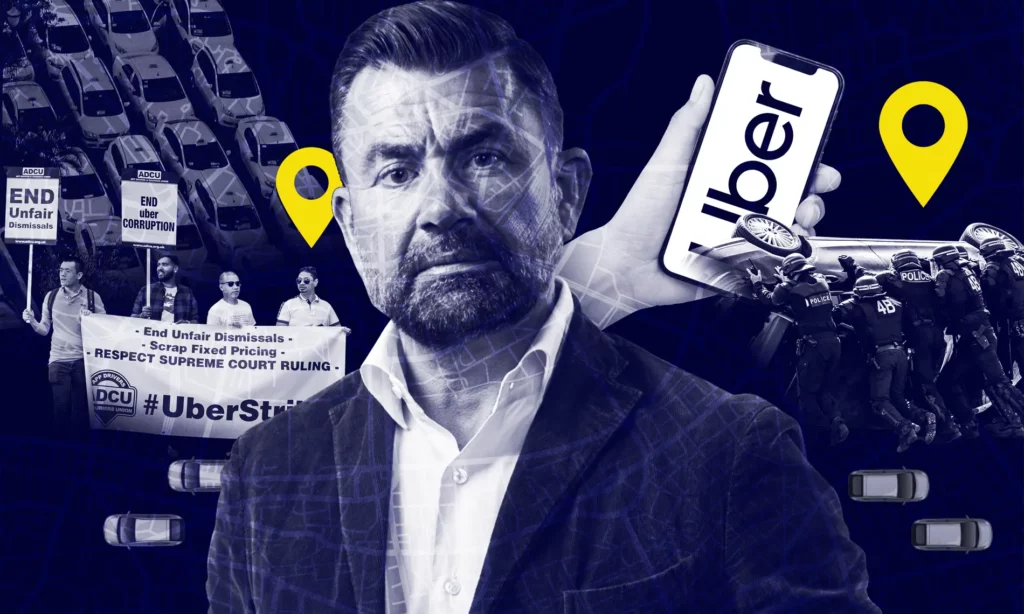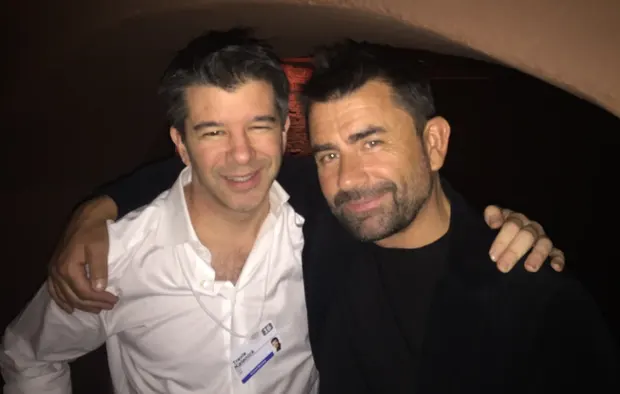The Uber Whistleblower: I’m Exposing a System That Sold People a Lie
WHISTLEBLOWING - SURVEILLANCE, 18 Jul 2022
Paul Lewis, et al. | The Guardian - TRANSCEND Media Service
Exclusive: Mark MacGann says he has decided to speak out about firm to ‘right some fundamental wrongs’.

The one-time cheerleader-in-chief for Uber in Europe, Mark MacGann now looks set to become one of its sharpest critics.
Composite: David Levene/Guardian Design/Alamy/Getty Images/Reuters
11 Jul 2022 – Mark MacGann, a career lobbyist who led Uber’s efforts to win over governments across Europe, the Middle East and Africa, has come forward to identify himself as the source who leaked more than 124,000 company files to the Guardian.
MacGann decided to speak out, he says, because he believes Uber knowingly flouted laws in dozens of countries and misled people about the benefits to drivers of the company’s gig-economy model.
The 52-year-old acknowledges he was part of Uber’s top team at the time – and is not without blame for the conduct he describes. In an exclusive interview with the Guardian, he said he was partly motivated by remorse.
“I am partly responsible,” he said. “I was the one talking to governments, I was the one pushing this with the media, I was the one telling people that they should change the rules because drivers were going to benefit and people were going to get so much economic opportunity.
“When that turned out not to be the case – we had actually sold people a lie – how can you have a clear conscience if you don’t stand up and own your contribution to how people are being treated today?”
The senior role MacGann held at Uber between 2014 and 2016 put him at the heart of decisions taken at the highest levels of the company during the period in which it was forcing its way into markets in violation of taxi-licensing laws. He oversaw Uber’s attempts to persuade governments to change taxi regulations and create a more favourable business environment in more than 40 countries.
He said the ease with which Uber penetrated the highest echelons of power in countries such as the UK, France and Russia was “intoxicating” but also “deeply unfair” and “anti-democratic”.
httpv://youtu.be/A14Vls_Y6ck
In his wide-ranging interview, MacGann detailed the personal journey that led him to leak the data years after leaving Uber.
“I regret being part of a group of people which massaged the facts to earn the trust of drivers, of consumers and of political elites,” he said. “I should have shown more common sense and pushed harder to stop the craziness. It is my duty to [now] speak up and help governments and parliamentarians right some fundamental wrongs. Morally, I had no choice in the matter.”
The Guardian led a global investigation into the leaked Uber files, sharing the data with media organisations around the world via the International Consortium of Investigative Journalists (ICIJ).
After MacGann identified himself as the whistleblower, Uber said: “We understand that Mark has personal regrets about his years of steadfast loyalty to our previous leadership, but he is in no position to speak credibly about Uber today.”
Responding to the wider investigation, Uber acknowledged past failings but insisted the company had transformed since 2017 under the leadership of its new chief executive, Dara Khosrowshahi. “We have not and will not make excuses for past behaviour that is clearly not in line with our present values,” a spokesperson said.
The Uber files consists of confidential company data that MacGann had access to at Uber. It includes company presentations, briefing notes, security reports and tens of thousands of emails and WhatsApp, iMessage and chat exchanges between the company’s most senior staff at the time.
They include Travis Kalanick, Uber’s combative co-founder and then chief executive, David Plouffe, a former Barack Obama campaign aide who became a senior vice-president at Uber, and Rachel Whetstone, a British PR executive who has also held senior roles at Google, Facebook and now Netflix.
When MacGann departed Uber in 2016, Whetstone described him as “a wonderful leader”. Plouffe called him a “talented public policy professional” and “terrific advocate for Uber”.
The one-time cheerleader-in-chief for Uber in Europe, MacGann now looks set to become one of its sharpest critics.
His profile as a senior executive and political insider make him an unusual whistleblower. So, too, does the fact he actively participated in some of the wrongdoing he is seeking to expose – and the fact it took him more than five years after leaving the company to speak out.
The process through which he came to re-evaluate what he witnessed at Uber was a gradual one, he says. “When I decided I had an obligation to speak up, I then went about finding the most effective, impactful way in which to do that. Doing what I am doing isn’t easy, and I hesitated. That said, there’s no statute of limitations on doing the right thing.”
MacGann is understood to have recently reached an out-of-court settlement with Uber after a legal dispute relating to his remuneration. He said he was prohibited from discussing his legal dispute but acknowledged he had had personal grievances with the company, which he alleges undervalued his role as an interlocutor with government and failed in its duty of care to him.
He accuses Uber under Kalanick’s leadership of adopting a confrontational strategy with opponents in taxi industries, that left him personally exposed. As a public face of Uber in Europe, MacGann bore the brunt of what became a fierce backlash against the company in countries including France, Belgium, Italy and Spain.
Amid threats to his life, he was given bodyguard protection. His experience of working at Uber, he says, took a mental toll and contributed to a subsequent diagnosis of post-traumatic stress disorder (PTSD).
Brazenly Breaking the Law
TO READ THE FULL EXPOSÉ Go to Original – theguardian.com
_________________________________________
by Paul Lewis, Harry Davies, Lisa O’Carroll, Simon Goodley and Felicity Lawrence
Tags: Big tech, Capitalism, Corruption, Exposé, International Consortium of Investigative Journalists, Investigative Journalism, Technology, Transnational Corporations, Uber, Whistleblowing
DISCLAIMER: The statements, views and opinions expressed in pieces republished here are solely those of the authors and do not necessarily represent those of TMS. In accordance with title 17 U.S.C. section 107, this material is distributed without profit to those who have expressed a prior interest in receiving the included information for research and educational purposes. TMS has no affiliation whatsoever with the originator of this article nor is TMS endorsed or sponsored by the originator. “GO TO ORIGINAL” links are provided as a convenience to our readers and allow for verification of authenticity. However, as originating pages are often updated by their originating host sites, the versions posted may not match the versions our readers view when clicking the “GO TO ORIGINAL” links. This site contains copyrighted material the use of which has not always been specifically authorized by the copyright owner. We are making such material available in our efforts to advance understanding of environmental, political, human rights, economic, democracy, scientific, and social justice issues, etc. We believe this constitutes a ‘fair use’ of any such copyrighted material as provided for in section 107 of the US Copyright Law. In accordance with Title 17 U.S.C. Section 107, the material on this site is distributed without profit to those who have expressed a prior interest in receiving the included information for research and educational purposes. For more information go to: http://www.law.cornell.edu/uscode/17/107.shtml. If you wish to use copyrighted material from this site for purposes of your own that go beyond ‘fair use’, you must obtain permission from the copyright owner.
Read more
Click here to go to the current weekly digest or pick another article:
WHISTLEBLOWING - SURVEILLANCE:

